- The World Turned Upside Down—Wednesday, October 15th, 2025
-
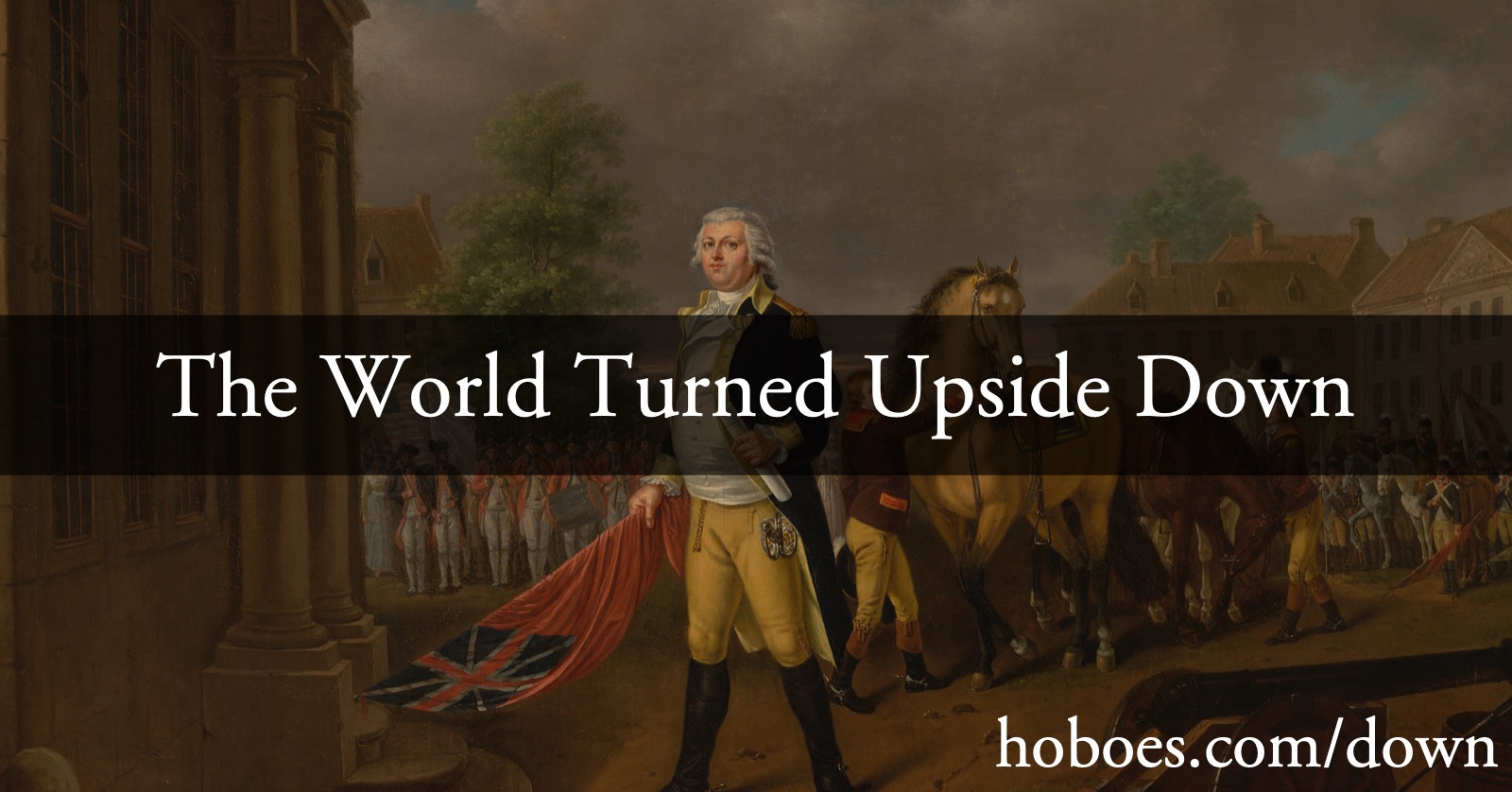
And of course I used the piano script from 42 Astounding Scripts to create a MIDI file and then GarageBand to make a slideshow of the Revolution.
One of the most enduring stories about the American Revolution is that of Lord Cornwallis’s surrender to George Washington at Yorktown on October 19, 1781. It was the beginning of the end of the revolution; all that was left were long negotiations for a peace treaty. As the British Army left the field on October 19, their band showed their confusion and dejection at having been beaten by a bunch of wild colonial boys by playing the then-popular song “The World Turned Upside Down (PDF File, 560.9 KB)”.
A Sestercentennial Year
- Battle of Bennington
- Upside Down Yorktown ⬅︎
- Cherry Valley Massacre
- Battle of the Kegs
- Sestercentennial Cookery
- The New Colossus
I thought it would be kind of cool to do the music for “The World Turned Upside Down” using the
pianoscript from 42 Astounding Scripts and Automations for the Macintosh. I didn’t know the song’s lyrics or its melody. All I knew was its title and the story of its use.It turns out practically no one knows it. “The World Turned Upside Down” may be the most famous song in American history that practically no one knows. I’m not the only person who has noticed this. While I was searching for period sheet music, I ran across Dennis Montgomery’s similar observation on American Revolution.org:
- Songs of the American Revolution—Wednesday, October 15th, 2025
-
Various songs, and the history of the songs, that made the Revolution—sometimes decades later.
- Light a candle for Christmas hymns—Wednesday, February 7th, 2024
-
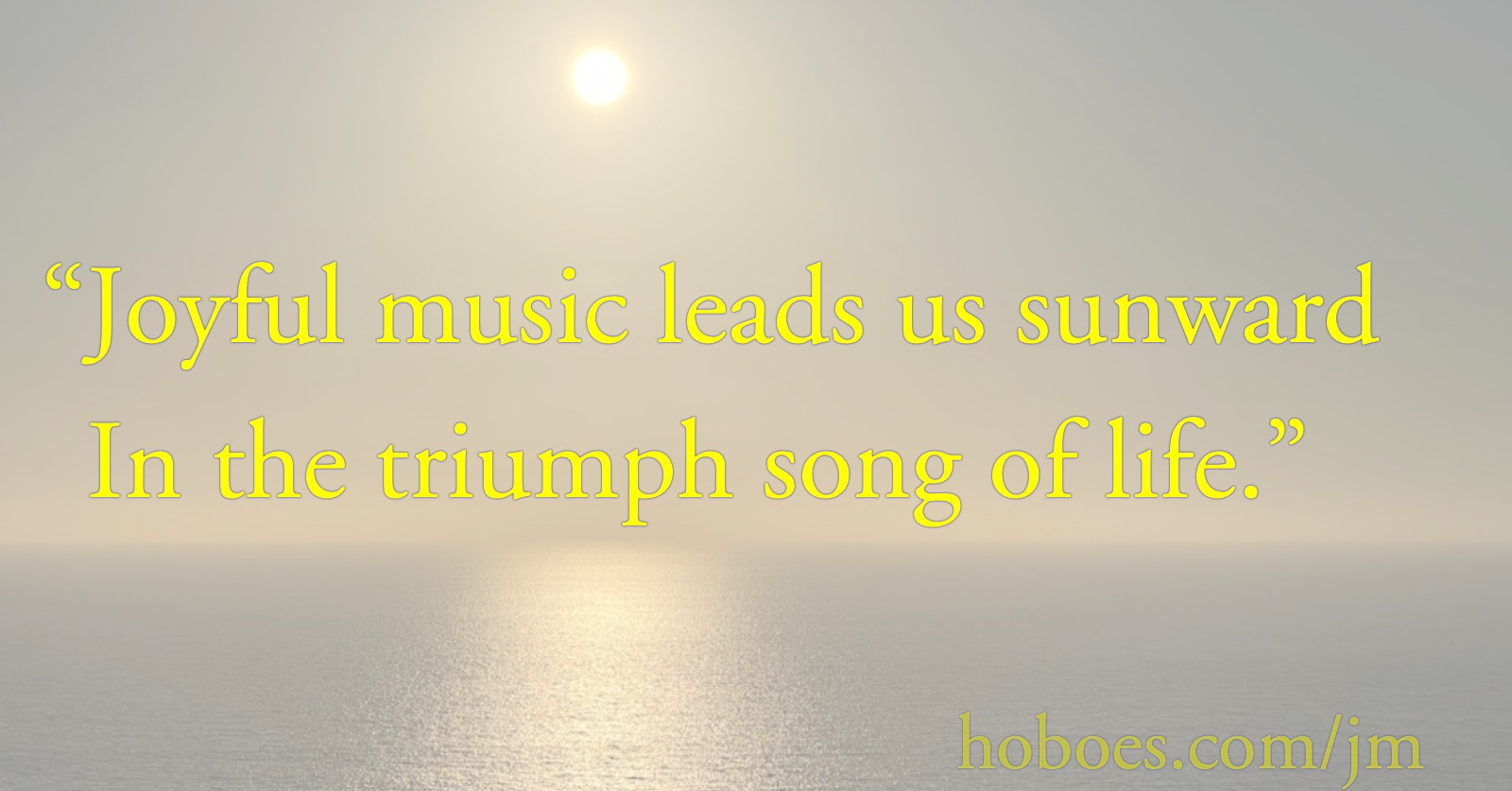
Christmas certainly has its share of bowdlerized hymns, some of them more consequential than others. But even the less consequential changes show a severe change in theology. O Little Town of Bethlehem, for example, has changed from humans to everything:
- For Christ is born of Mary,
- And gathered all above,
- While mortals sleep, the angels keep
- Their watch of wond'ring love.
- O morning stars, together
- Proclaim the holy birth!
- And praises sing to God the King,
- And peace to men all on earth.
Belying the claim that these are merely modernizing the lyrics, the new bowdlerized lyrics retain “thee” and “thy”.
Looking up the new lyrics, I ran across an interesting article from 1986 about Methodists making a new hymnal. O Little Town of Bethlehem fared better than Onward Christian Soldiers and Battle Hymn of the Republic, which were removed completely. Fortunately, actual Methodists complained loudly enough that these powerful—and, in one case, anti-slavery—hymns were restored before publication.
Complaining about bowdlerization does occasionally work, as we’ve also discovered at my church.
Hark the Herald Angels Sing has seen a similar change. The ever-popular replacement of all mankind with “we” is a weird one. It’s as if the editors of hymnals are uncomfortable with spreading the word of God throughout the world, and want to confine it only to people who have already been graced with it.
- Hail, the heav’n-born Prince of Peace!
- Hail, the Sun of Righteousness!
- Light and life to all he brings,
- Ris’n with healing in his wings.
- Mild he lays his glory by,
- Born that man we no more may die,
- Born to raise the sons of us from the earth,
- Born to give them us second birth!
I’ve also seen the version “Born that all no more may die”.
The funniest of these I’ve seen recently is not a Christmas song at all. I Am the Bread of Life is filled with references to mankind as a whole.
- Our parental unit, who art, somewhere, maybe—Wednesday, May 3rd, 2023
-
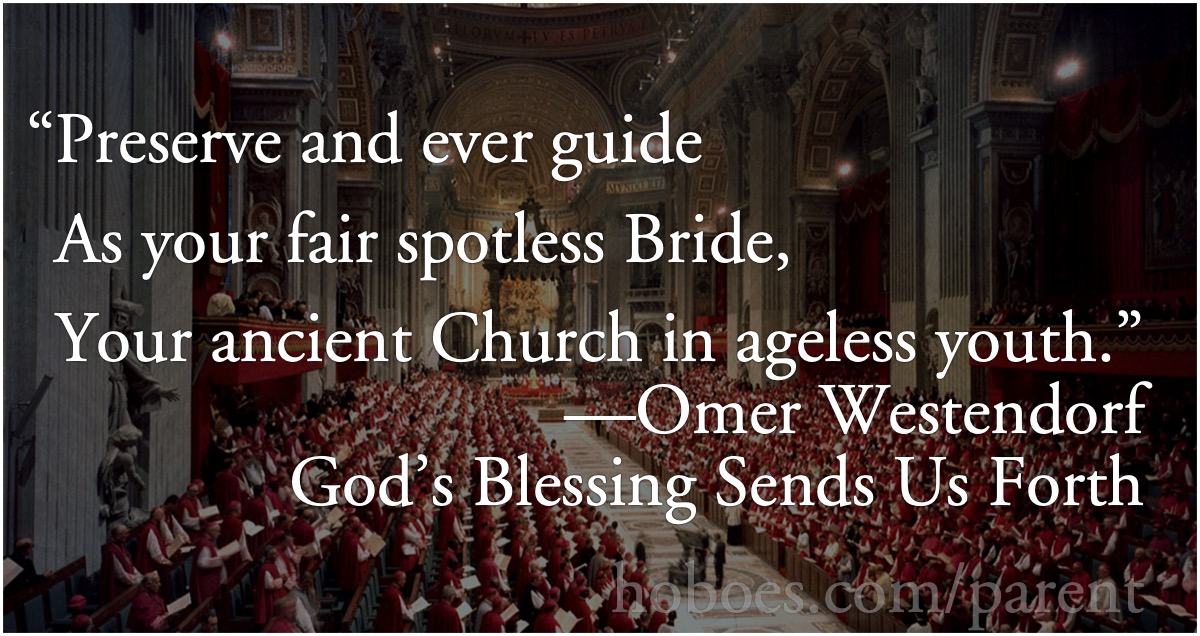
Omer Westendorf wrote many of his hymns in response to Vatican II. He deliberately chose his words to bring us closer to God. When hymnal bowdlerizers change his words, they’re changing that meaning. Westendorf’s God’s Blessing Sends Us Forth fares especially poorly under the bowdlerizer’s pen.
Like Where Charity and Love Prevail Westendorf wrote a modern song that speaks to modern issues. It has now been nearly completely depersonalized and has even had crucial teachings removed.
The spirit is no longer God’s spirit, but the Spirit: “May God with us remain, Through us his spirit reign” becomes “Through us the Spirit reign.” It’s both a serious change in meaning and an utterly silly one; it really does seem that the bowdlerizers are doing a global search on personal pronouns to remove them solely for the sake of removing them.
Where the bowdlerizers reduced the brotherhood of Christians in Where Charity and Love Prevail into a homogenous family, here they’ve gone and reduced the brotherhood of man to merely the people present at Mass. “So we are one in true brotherhood” becomes “So we are one as we share this food”.
The living bread we’ve been fed isn’t just the Eucharist. It is Jesus Christ himself, who died for all of us, not just the people singing the song and not just the people singing the song who also went up for the Eucharist. Westerndorf didn’t just realize this, he emphasized it. The bowdlerizers either don’t realize it, or don’t want us to believe it.
The change from “How gracious to behold all brethren of one fold” to “All people of one fold” would probably be innocuous on its own, but I just can’t trust people who would change…
- Preserve and ever guide
- As your fair spotless Bride,
- Your ancient Church in ageless youth.
to
- Bring us unto your side;
- Preserve and ever guide
- Your ancient church in ageless youth.
It is especially ironic that this comes after “Lord, you alone are unchanging Truth.” There are no unchanging Truths when the bowdlerizers get involved. The Church is no longer the Bride of Christ. It’s just some sort of ageless vampire, some roué with a Picture of Dorian Gray in their attic, living unchanged down through the centuries.
- Though the Darkness Hide Thee—Wednesday, April 27th, 2022
-
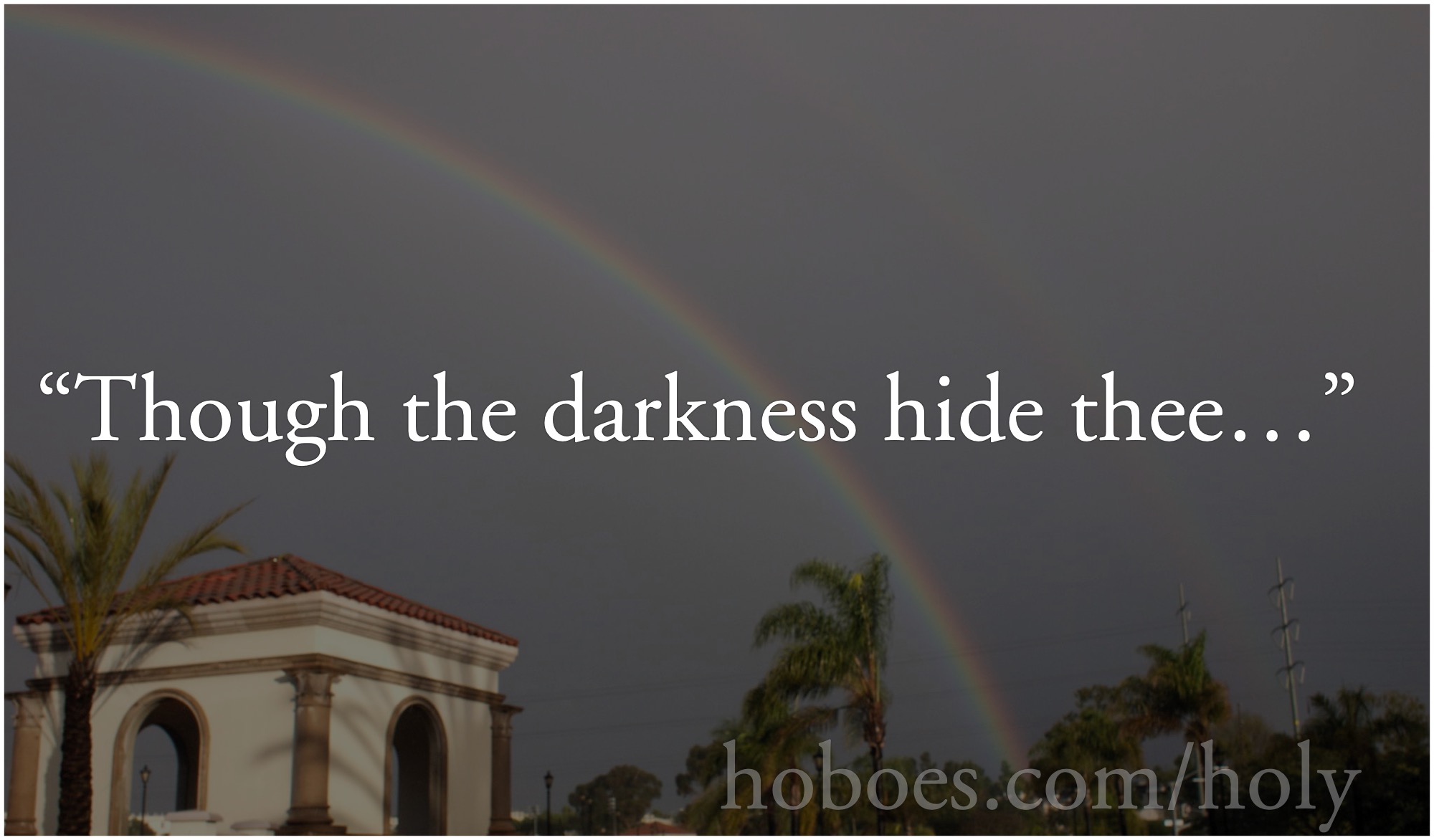
There are some glories that God does allow us to see, such as the symbol of his saving grace.
Just before Easter I posted a piano file for the hymn Holy, Holy! Lord God Almighty!. The song came to my attention at a recent mass with more modern lyrics that reminded me of the annoying tendency of modernizers to dehumanize and bowdlerize once-insightful songs. References to man’s sinful nature may offend some, but they are necessary to accept God’s grace.
When hymnal publishers update lyrics that refer to humanity, removing the references to “men” or “man” and replacing them with “us” or “all” or reworking the line to excise the reference to humanity entirely, most of the time the changes end up just looking silly, as when they replace all of mankind with the self-centered “us”. Or when “And if wicked men insult and hate you” becomes “And if wicked tongues insult and hate you”.
Really? It’s the tongue that’s doing the hating, and not the people? It seems that if these modern bowdlerists were sincere in wanting to improve the texts and thought that providing body parts with agency would do so, they’d at least choose the brains or the mind rather than the tongue, but of course that would be too close to acknowledging that wicked people exist.
In many cases, the changes seem explicitly designed to exclude everyone except the congregation. When hymnals replace “Let men their songs employ” in “Joy to the World” with “Let us our songs employ”, we’re no longer speaking of humanity when we sing the songs. It’s supposed to be joy to the world, not joy to us. One of the great messages of Christ is that he was Christ for the world.
But there’s a deeper and more dangerous reason for those kinds of changes. The dehumanization of the lyrics externalizes the sin both from humanity and from the singer. I’m not a sinner. It’s my tongue that does the sinning, it’s my eye that’s sinful. Of course, if the bowdlerizers making those changes actually believed that, they’d be both mute and blind, because they would follow Jesus’s command to tear out the sinful flesh.
But they don’t believe that. They just want to dehumanize sinfulness.
Among the worst of these are the changes made to “Holy, Holy! Lord God Almighty!”. Originally, it very clearly put the sin on man and not on man’s body parts—when it mentioned sin at all.
- Depersonalizing God in modern hymns—Wednesday, February 23rd, 2022
-
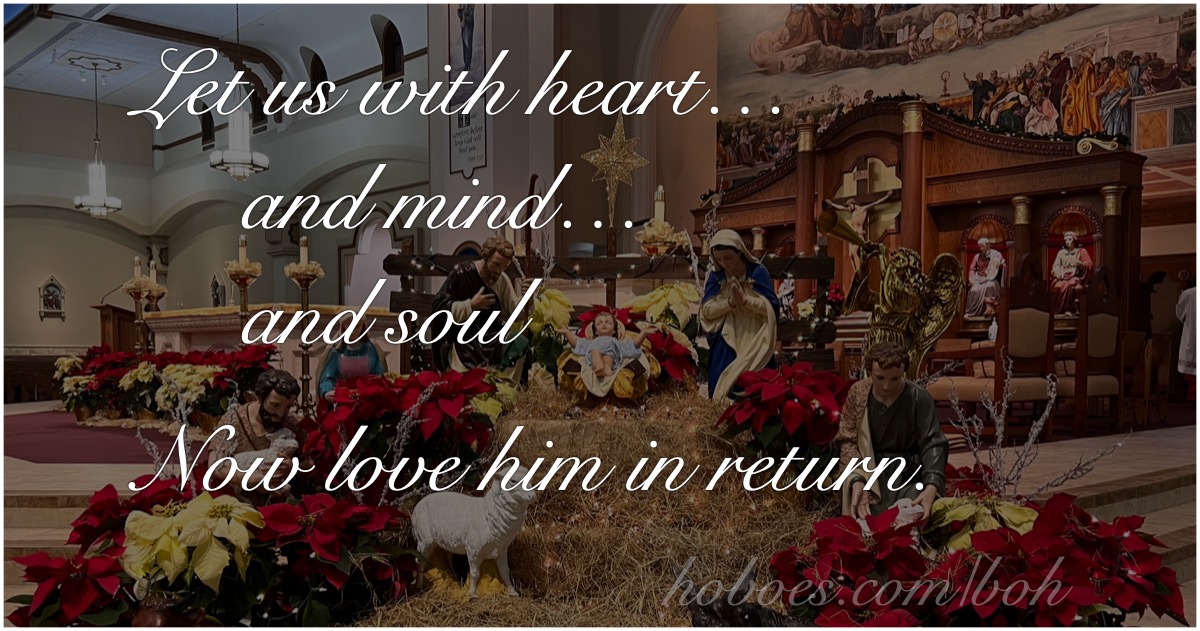
I have an upcoming post about how modern hymnal editors are bowdlerizing older hymns to distance mankind from any acknowledgement of sinfulness. But there is another class of bowdlerization that distances men from God Himself: changes that downplay the very existence of God as a guide and confidant, as a father who speaks in our hearts.
Hymns are replacing personal pronouns in lyrics—that are literally about God the father—with neutral and less personal titles.
We sang Where Charity and Love Prevail for the offertory hymn several weeks ago. Every lyric that personalizes God has been depersonalized. Most of them are innocuous, but one especially is not, and the combination is both stilted and distancing. The earliest verified lyrics I’ve found are from the 1966 Peoples Mass Book; they remain the same up to at least the 1984 edition. The original lyrics of the second verse are:
- With grateful joy and holy fear
- His charity we learn;
- Let us with heart and mind and soul
- Now love him in return.
Sometime after 1984 they were changed to:
- With grateful joy and holy fear
- God’s charity we learn;
- Let us with heart and mind and soul
- Now love God in return.
The change from pronouns to God throughout the lyrics makes for very stilted language. “Be ours his holy peace” becomes “Be ours God’s holy peace”, and so on. Every place in the lyrics where we once sung about God as someone we know has become depersonalized to a title.
It’s like they just took a global search and replace across the entire lyrics without regard for meaning. In fact, it almost looks like they globally searched and replaced on His and thus missed what I assume is a lowercased “his” in the fifth verse.1 It’s also possible that, since the line speaks specifically of Christ2, the bowdlerizers haven’t yet decided that Jesus the Son isn’t deserving of “his”. They may be prepping for the change: they did replace “him” with “Christ” in the fifth verse:
- Let us recall that in our midst
- Dwells God’s begotten Son;
- As members of his Body joined
- We are in him made one.
becomes:
- Let us recall that in our midst
- Dwells God’s begotten Son;
- As members of his body joined,
- We are in Christ made one.
- Hymns—Wednesday, February 23rd, 2022
-
Musings about hymns, and about modern bowdlerism as it applies to Christian, especially Catholic, lyrics.
- Catchy Little Tune—Friday, August 23rd, 2013
-
Ray Stevens is great. This “catchy little tune” is a neat surprise all the way through. It’s from his variety show in 1970.
Ray is known more for great comedy tunes like Ahab the Arab and Gitarzan, which are definitely worth searching out, but he’s got a sentimental streak (pun intended) a mile wide.


Mimsy Were the Borogoves
Music: Are you ready for that? Driving your car down a desert highway listening to the seventies and eighties rise like zombies from the rippling sand? I hope so.